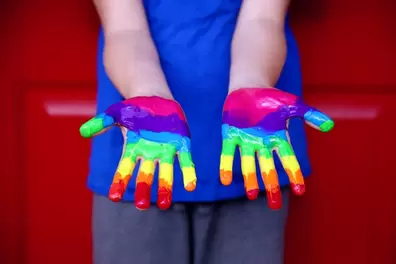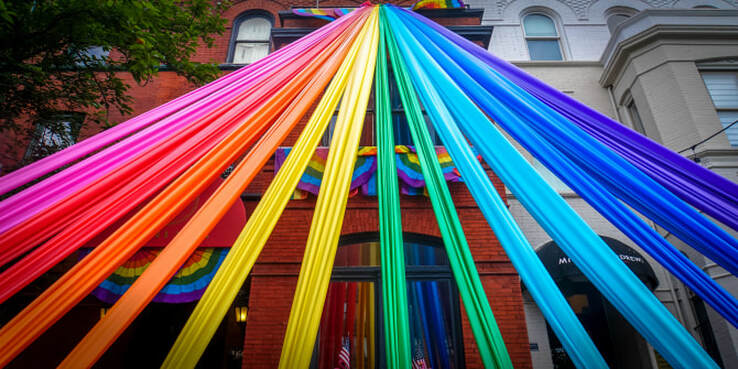|
by Scott MacLean  via Unsplash via Unsplash Can you name one gay superhero? I can’t. How about a wizard? Warrior? Villain? The sad fact of the matter is that I’ve read over two hundred young adult fantasy books and I know of only one that has a main character that’s gay. Now I know what you’ll say, media and literature is much more inclusive these days, which is true. According to a 2019 report done by GLAAD, the percentages of LGBTQ representation are at an all time high, and I’ll be the first to admit that it’s nice to have more options, especially in literature, but why hasn’t this translated to fantasy and other genres? I’m glad I can watch a show like Schitts Creek or read a book like The Gravity of Us by Phil Stamper, examples of quality LGBTQ stories that aren’t entirely centered on the fact that the characters are gay, but unfortunately, kids aren’t dressing up as Kurt Hummel from Glee on Halloween. They’re dressing up as Harry Potter, Daenerys Targaryen, or Harley Quinn, heroes from epic stories full of adventure.  via Pixabay via Pixabay Growing up, I had no gay role models, nobody to look up to. When I realized I was gay, I had no one to turn to. I couldn’t look to my favorite protagonist with pride and think “well at least he’s gay too.” When I finally did see my first depictions of gay men in movies and literature, they weren’t particularly happy stories. Most of the time, I was lucky if the main character didn’t end up dead by the end. I understand the importance of showcasing stories about the real life struggles that LGBTQ individuals go through, but is it so wrong to want a story where the main character just happens to be gay and it’s not a HUGE deal? We need to normalize LGBTQ narratives that don’t revolve around the fact that they’re LGBTQ. Think about it this way: let’s take an example I used earlier, the beloved Harry Potter series, and alter the narrative to make Harry Potter gay. Does it really change anything about the books? Sure, he’d end up with someone else instead of Ginny, but he’s still going to be fighting off dementors, winning quidditch games, and battling Voldemort. Weeks after the release of Harry Potter and The Deathly Hallows, J.K. Rowling announced that Dumbledore was gay, although his sexuality is never discussed in the books. Many celebrated the “representation,” but I find the announcement downright insulting. What’s the point of even mentioning it if you’re never going to write it into the books? This brings me to a major problem in literature and other media: queerbaiting. Many books find ways to tease readers with LGBTQ themes as a ploy to appeal to a wider audience. Hinting at queer characters or relationships should never be a plot device to gain viewership. My point is, while many use literature and other media as a means to escape from reality, oftentimes we find ourselves identifying with the characters that come to mean so much to us. So when a young boy or girl begins to question their sexual orientation, maybe if they had some examples of happy or heroic narratives involving LGBTQ characters they wouldn’t feel so frightened by the possibility that they aren’t straight. Literature can provide a vulnerable reader a safe haven—a sense of camaraderie—during an increasingly confusing period of their life, when everything else in the world doesn’t make sense. So if books have this magical ability to guide young readers, why in the world aren’t we using them to their fullest potential? Put simply, here’s what I propose: MORE. More representation, more LGBTQ characters, more stories depicting LGBTQ narratives in ALL genres. I want a bisexual hardcore detective who solves crime with witty remarks. I want a shy transgender man falling in love with the mysterious neighbor who just moved to town. I want a gay superhero who saves the world, someone who kids will want to dress up as on Halloween. I want a lesbian who goes on a spiritual journey as she treks across Alaska. Most of all, I want a gay protagonist in one of my hundreds of beloved young adult fantasy books. Give me the harrowing coming out stories, give me the beautiful romances that end in marriage, give me the comedic adventures that barely touch on the fact the main character is gay; I’ll take them all! Show the young readers of today that being gay isn’t the end of the world and that it isn’t the sum of our being--it’s only one piece of who we are, and it’s just as beautiful and normal as all the other pieces.
0 Comments
Leave a Reply. |
Archives
July 2024
Categories
All
|
|
Glassworks is a publication of Rowan University's Master of Arts in Writing 260 Victoria Street • Glassboro, New Jersey 08028 [email protected] |
All Content on this Site (c) 2024 Glassworks
|


 RSS Feed
RSS Feed
